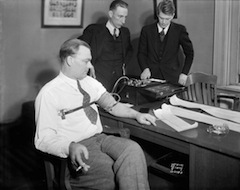 You’ve seen them on TV crime dramas. A potential suspect is wired to a machine via a series of sensors attached to his body while he is grilled by an expert operator with a series of probing questions. Eventually, a needle goes haywire, and the lie is revealed. Well, not so fast. There are some serious misconceptions about the lie detector test, and we’re going to discuss ten of them below:
You’ve seen them on TV crime dramas. A potential suspect is wired to a machine via a series of sensors attached to his body while he is grilled by an expert operator with a series of probing questions. Eventually, a needle goes haywire, and the lie is revealed. Well, not so fast. There are some serious misconceptions about the lie detector test, and we’re going to discuss ten of them below:
- The Name Itself– The first misconception to address is the very name lie detector test. It is more correctly known as a polygraph, and can be more accurately considered to be a truth verifier test, because …
- They Don’t Detect Lies – Polygraphs can confirm that a person is responding truthfully to a question; however, the body functions that are monitored in a polygraph test will not specifically identify a lie, simply an abnormal physiological reaction.
- They Are 100% Accurate – When administered by an experienced professional examiner, a polygraph test can be very accurate in establishing truth or indicating deception, but there are many factors that can alter their reliability.
- They Are Not Admissible In Court – Contrary to the belief even among some lawyers, this is no longer universally true. There have been cases where polygraph results have been entered as evidence in trials.
- You Can “Beat” A Polygraph Test – A professional examiner will conduct a polygraph in three phases – the pre-exam interview, the polygraph exam, and the post-exam interview – over the course of several hours. The exam will include control questions, which are designed to confirm the truthfulness of the responses.
- Drugs Can Help You Beat The Exam – Drugs or medications won’t aid in defeating a polygraph. Part of the pre-exam phase is for the examiner to ensure that the subject is fit to take the exam, and verify if any medications have been taken.
- Nerves Can Affect The Results Of A Test – Nervousness does not register in the same way the physiological response of the nervous system does during a polygraph. Also, the examiner will work with the subject throughout the process to ensure that they are as relaxed as possible.
- Polygraphs Include Trick Questions Intended to Elicit A Response – In fact, the respondent will be made aware in advance, of every question he will be asked in the polygraph exam. There are no surprise questions.
- Control Questions Are Standard Questions With Standard Responses – Not exactly. A control question is not something like “Is your last name Lipschitz”. The purpose of a control question is to induce the subject into giving a deceptive answer, so that the examiner can have reliable measurements of what a deceptive response will look like.
- You Only Fail If You Lie – While polygraphs do have a high percentage of accuracy when administered by a well-trained and qualified examiner, it’s quite possible to be completely truthful and still “fail” a polygraph exam.
No comments:
Post a Comment